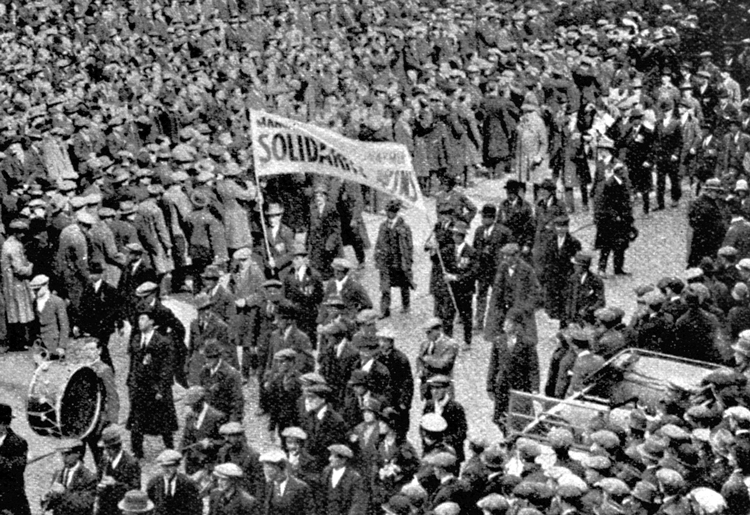Where Is Britain Going? by Leon Trotsky is one of Pathfinder’s Books of the Month for May. Trotsky was a central leader of the 1917 Bolshevik Revolution and the Communist International under V.I. Lenin. The book describes how the working class in Britain radicalized in the wake of the Russian Revolution. In a section written after the powerful 1926 general strike, Trotsky discusses how the misleadership of the trade union officialdom led to its defeat. He explains how class conscious workers fight to make their unions both “militant economic organizations” and “schools of political education” preparing the working class to take political power. The excerpt is from the opening chapter, “England’s Decline.” Copyright © 1973 by Pathfinder Press. Reprinted by permission.
Capitalist England was launched by the political revolution in the seventeenth century and the so-called industrial revolution at the end of the eighteenth century. England emerged from the epoch of the civil war and [Oliver] Cromwell’s dictatorship a little nation, with hardly 1,500,000 families; it entered the imperialist war in 1914 an empire, embracing within its boundaries one-fifth of all mankind.
The English Revolution of the seventeenth century, of the Puritan school, the hard school of Cromwell, prepared the English people, particularly its middle classes, for their approaching world function. After the middle of the eighteenth century, the universal might of England is indisputable. England rules on the seas and on the world market which is its creation. …
The tremendous industrial preponderance of England over the rest of Europe and over the rest of the world was the basis of its wealth and of its unprecedented world position. The industrial century was simultaneously the century of Great Britain’s world hegemony.
From 1850 to 1880, England was the industrial school for Europe and America. But this very fact undermined its special monopolistic position. With the 1880s, England begins perceptibly to weaken. New nations, particularly Germany, enter the world arena. Simultaneously, the capitalist primacy of England begins for the first time to reveal its unfavorable and conservative aspects. Powerful blows are delivered by German competition to the doctrine of free trade.
The crowding out of England from its position of world ruler thus begins to appear clearly as early as the last quarter of the nineteenth century, giving rise, at the beginning of the present century, to a condition of internal uncertainty and ferment in the upper classes, and profound molecular processes, basically of revolutionary character, in the working class. Mighty conflicts of labor and capital played the chief part in these processes. Not only the aristocratic position of English industry in the world was shaken, but also the privileged position of the labor aristocracy in England.
The years 1911-13 were a period of unparalleled class battles waged by mine workers, railroad workers, and the transport workers in general. In August 1911, there developed the general strike on the railroads. In those days the vague specter of revolution hovered over England. The leaders exerted all their strength to paralyze the movement, under the slogan of “patriotism”; this was at the time of the Agadir incident [bomb explosion], menacing war with Germany. The prime minister, as we know now, summoned the labor leaders to a secret conference and called upon them to save the fatherland. And the leaders did all they could to strengthen the bourgeoisie and in this way prepare the imperialist war.
The war of 1914-18 interrupted this revolutionary process and stopped the growth of the strike wave. Ending in the destruction of Germany, it seemed to restore to England the role of world hegemony. But it soon became apparent that instead of retarding the decline of England, the war had actually accelerated this decline.
In the years 1917-20, the English labor movement entered into an extremely stormy phase. Strikes assumed immense proportions. [Ramsay] MacDonald was signing manifestoes from which he now recoils with shudders. Only after 1920 did this phase terminate with Black Friday, when the leaders of the Triple Alliance of coal miners, railroad and transport workers betrayed the general strike. The energy of the masses, frustrated in the economic field, turned to the political sphere. The Labour Party seemed to spring up overnight.
What is the cause of this shift in the external and internal situation of Great Britain?
During the war, the enormous economic preponderance of the United States was developed and revealed in its full proportions. The emergence of that country from the stage of an overseas provincialism suddenly forced Great Britain into second place.
The “cooperation” of America and Great Britain is the expression, for the moment peaceful, of the increasingly pronounced outdistancing of England by America. …
The productive forces of England, particularly its living productive force, the proletariat, no longer correspond to the position of England on the world market. Thus the chronic state of unemployment. …
One of the conditions of “cooperation” between England and America is the repayment of the gigantic British debt to America, while there is no hope of England’s ever obtaining a repayment of the debts incurred by the continental states. The economic alignment of forces is thus further shifted in favor of America.
On March 5, 1925, the Bank of England raised its discount rate from four to five percent following the action of the New York Federal Reserve Bank, which had raised its rate from three to three and one-half percent. In the City [London’s banking district] this served as a harsh reminder of its financial dependence on its transatlantic cousin. … This measure reacts to the disadvantage of English trade and industry by rendering more costly its necessary supplies. In this way, America is showing England her place at every step: on the one hand, by the methods of diplomatic pressure; on the other, by measures of a banking nature, always and everywhere a pressure of America’s gigantic economic preponderance.


